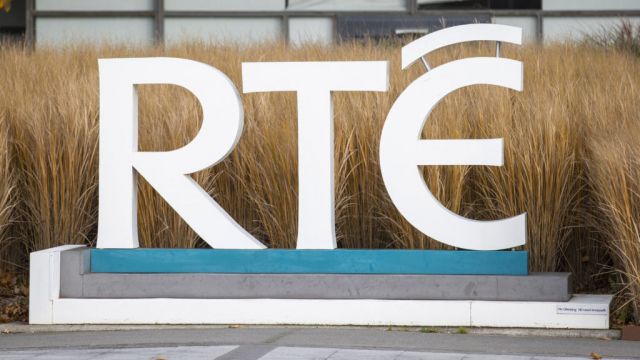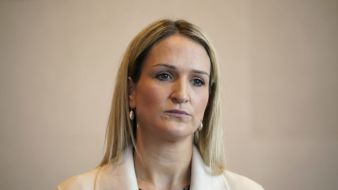RTÉ is currently “completely unable” to release details of executives’ exit packages dating back to 2016, the director general has said.
Kevin Bakhurst said the organisation has been under pressure to release those details but said he has received legal advice that to do so would be breaking the law.
On publishing that advice, the national broadcaster confirmed that it has asked former executives to waive their right to confidentiality on their exit agreements.
It follows the revelation that former chief financial officer Breda O’Keeffe received a voluntary redundancy package worth €450,000.

Mr Bakhurst has also defended a decision to give an exit payment to former strategy director Rory Coveney, who was described as the “driving force” behind a musical which accrued €2.2 million in losses for the broadcaster.
However, the exact amount of the payment has not been disclosed.
Advice by legal firm Arthur Cox, published by RTÉ on Thursday, states that both employees and former employees have a legal right that their personal data relating to their employment is not made publicly available.
“If such information is published, we remain of the view that this would contravene employees’ contractual and statutory rights thereby exposing RTÉ to avoidable legal challenge,” a letter dated February 21 stated.
While RTÉ has sent letters to executives asking them to waive confidentiality themselves, Mr Bakhurst said: “I don’t want the expectations to be very high because that is entirely their gift to waive their confidentiality.”
Speaking to RTÉ’s News At One radio programme, the director general said he would be examining “other ways of driving transparency” looking forward.
Mr Coveney, the brother of enterprise minister Simon Coveney, received a package when he resigned and his role was made redundant in July last year – the same week Mr Bakhurst took the helm.

Mr Bakhurst said RTÉ expects to recoup the cost of the payment to Mr Coveney by July this year.
The director general also said there were no grounds to sack Mr Coveney and that if he had taken an unfair dismissal case, he would have typically been entitled to two years’ pay.
Mr Bakhurst said, in that circumstance, RTÉ could potentially have been forced to pay out “double” what Mr Coveney was actually given.
These comments have contributed to speculation the payment was approximately one year’s salary, believed to be up to €200,000.
When asked at the time if Mr Coveney had received an exit fee “going out the door”, Mr Bakhurst told reporters on his first day in the job that there was no “ex gratia” payment and added that it was not fair to talk about individuals.
He said: “He didn’t get a payment going out the door, but he is entitled, as other people are, to statutory-level payments when they leave an organisation.”
Asked about the comments on Thursday, Mr Bakhurst said: “I was trying to be as accurate as I can within the realms of the confidentiality – that’s made clear here – that he deserves.”
Acknowledging his comment may have been influenced by his previous work in the UK, he said: “Statutory level would normally mean a week for every year of service, is my understanding.
“So I was trying to give an idea that he did get paid, but not an extortionate amount without giving the exact details.
“I was trying to tread a careful line between being as open as I possibly could in the circumstances but trying to respect what’s been laid out in these legal letters.”

It was put to Mr Bakhurst that a statutory redundancy payment in Ireland, which is two weeks’ pay capped at 600 euros per week for every year of service plus one bonus week, would likely be less than 20,000 euros in the case of Mr Coveney’s 16 years of service.
The director general replied: “I think that maybe that’s where I misspoke.”
It was further put that he had presented a situation where Mr Coveney was given a modest payment.
Mr Bakhurst said: “That’s not what I intended at the time.”
In a separate legal letter from February 21, with the subject line ‘certain arrangements entered into with former employees’, Arthur Cox states that the deals agreed “represented a better commercial outcome” for RTÉ than alternatives.
“We can confirm that these arrangements were carefully considered weighing up legal risk along with the cost, time and uncertainty surrounding alternative options.
“In our view, the terms ultimately agreed represented a better commercial outcome for RTÉ than the alternative options available combined with the attendant risks associated with same and fell within parameters of similar arrangements we have seen in both the private and semi-state sectors.”
Asked if the organisation would be prevented from publishing the details of only some of the executives’ exit arrangements due to leaving open a process of elimination for individuals who decline to waive confidentiality, Mr Bakhurst said this would be something RTÉ would have to look at “very carefully”.
In a third letter dated October 5, it acknowledges RTÉ’s aim for transparency, but said it is “in receipt of a number of objections and complaints expressing concerns about the potential disclosure of personal data without the consent of the employees concerned”.
“If such information is published in a manner where employees could be identified then we are of the view that this would create significant employee and industrial relations issues for RTE, as well as potentially resulting in legal exposure depending on the nature of the publication.
“The potential for such issues is borne out by correspondence RTÉ has received to date from concerned current and former employees.”
Arthur Cox also said it is not aware of any contractual provision that contemplates the general publication of employees’ information, and said the release of sensitive data could “undermine the trust and confidence” required in employer-employee relationships.
Mr Bakhurst said RTÉ was examining caps on exit payments and looking at making confidentiality agreements “very much the exception”.
However, he added: “There are ramifications with that.
“If you put a cap on exit payments, and you are going through a period which you will have to shrink the organisation, you will end up unduly shrinking the organisation by losing junior colleagues because you can’t afford to pay off more senior people – whether it’s under an extra scheme or whatever else – to go.”







